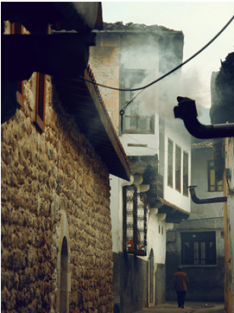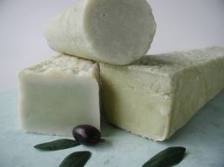Last year my wife and I visited one of the most charming cities in Turkey. Antakya, or in ancient biblical times, Antioch. It was on the streets of that city, which so beautifully has contained the history of the city in its culture and architecture, that we came across a shop.

It was far away from the hustle bustle of the main streets, and away from the touristy sights. It was the handmade shawls that first caught my wife’s eye. Then as we entered, we were greeted by the shop-owner, “Hosh Geldiniz!” I remember also being greeted by the aroma of those earthy soaps with a delight that has yet to dissipate, to this day. It was such an earthy, crisp and clean, and wholesome smell, that I began to ask what they were. It was something traditional to Antakya he said. They were olive oil soaps mixed with “defne” or laurel oil.  They were nothing fancy that hit those high notes of sweet, or sunk deep to satisfy the exotic. It was simply something pure, traditional, and right. He explained locals love them, because the defne helps with the summer heat and sweating. So we bought some.
They were nothing fancy that hit those high notes of sweet, or sunk deep to satisfy the exotic. It was simply something pure, traditional, and right. He explained locals love them, because the defne helps with the summer heat and sweating. So we bought some.
It proved to be much more than just helpful, as it truly brightened my showering experience. I felt like I was partaking in tradition somehow, even though it was just a shower. I never liked bar soaps mostly for how they left me feeling afterward. Dry mostly. This was different, and the aromas in the shower…again not anything surprising, but simply pleasing. It’s those small things in life that sometimes brings that pip back, or puts that spring back into your step.
As we continued to peruse museums there, and other museums in later months, the theme of laurel surfaced again and again.
Laurel branches were important in Roman mythology. Daphne caught the eye of Apollo when she was a water nymph, and loved to give him a good chase. But when she almost got caught by Apollo, she cried out to Mother earth for her to cover her, and hide her, so she turned her into a Laurel tree. Apollo can be seen in stone reliefs wearing a laurel wreath on his head.
The history of the actual soap being made from olive oil goes way back farther than the Romans, to the Babylonian empire in 2800 BC. People have been scrubbing down with this stuff for a long time I guess. As far as Antakya goes, it is very famous for its olive and laurel soap, as laurel trees grow around that area. Antakya was a big city back in its hay day in the Roman Empire. In fact, it was in the running to pass Rome in its importance and become the next Roman capital, when a tragic earthquake hit. Whether the large Roman city was manufacturing this sort of soap in that day, I’m not sure. A more historically traceable type of soap, perhaps almost identical to Antakyan soap, is Allepo Soap, made in the city or surrounding area of Allepo, Syria. The traditional ingredients are the same as those in Antakya; olive oil, lye, and laurel berry oil. We know that soap manufacturing can be traced westward from this city. Stinky crusaders credited Allepo for giving them soap making know-how, and gradually along the Mediterranean, soap technologies spread.
Nowadays, wherever you go, you may be able to find a wide variety of artisan soaps being sold in markets or fairs. From cappuccino caramel scented soaps, to plain mint, one would think they are buying some sort of NASA food, made for astronauts. As for me, I’m sticking with tried and true simplicity, with a dash of history.
In case your curious, here are some benefits to the soap;
- Broad effective uses for daily use, shampooing, face masks, baby-safe and shaving cream. In my experience, it tends to be the soap of choice for public hamams (Turkish baths, styled after the idea of a Roman bath-house)
- Is effective for wound healing, and against bug bites.
- Helps relieve the symptoms of skin disorders like eczema, psoriasis and acne.
- Compounds in laurel oil have been found to be inhibitors of skin cancer and other tumor growths.
- And finally…it floats, unlike other soaps. The scientific ramifications of this anomaly have yet to be researched though.
















